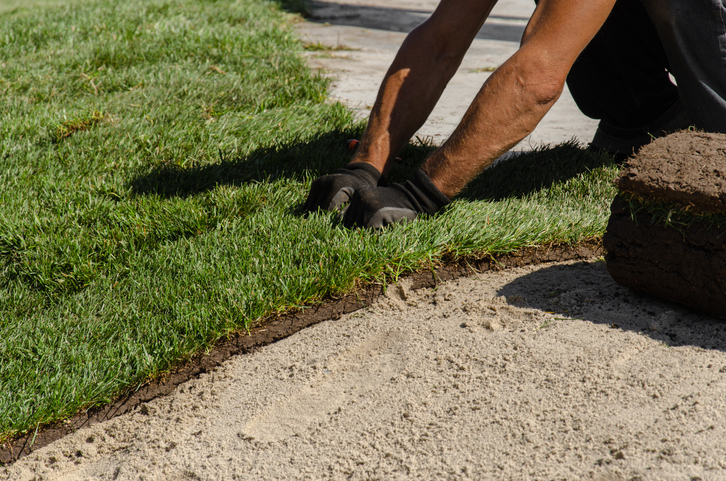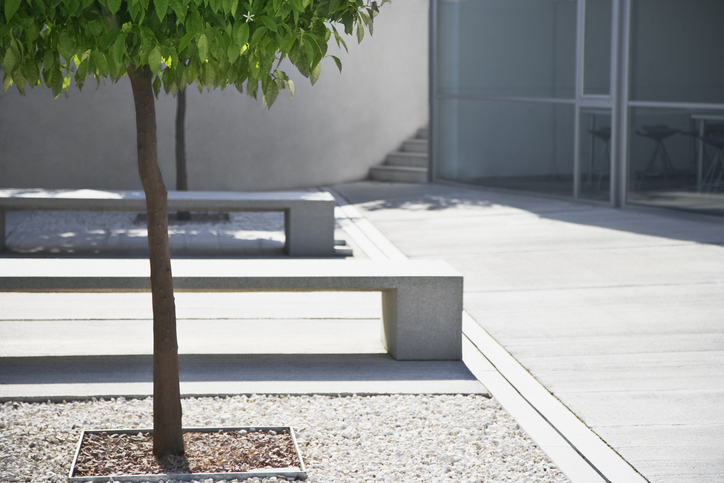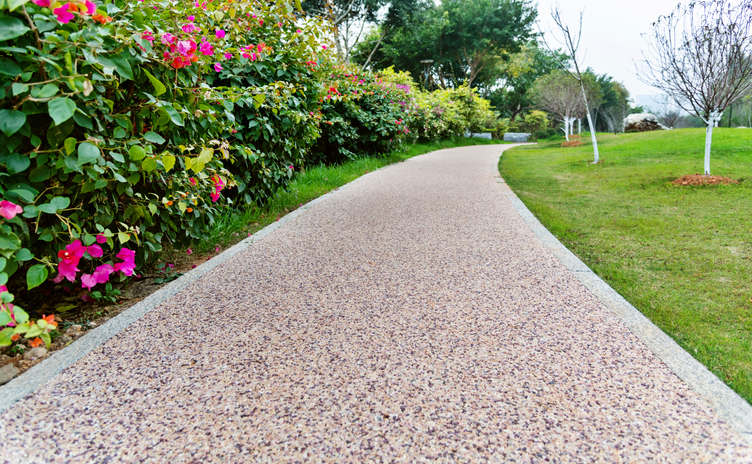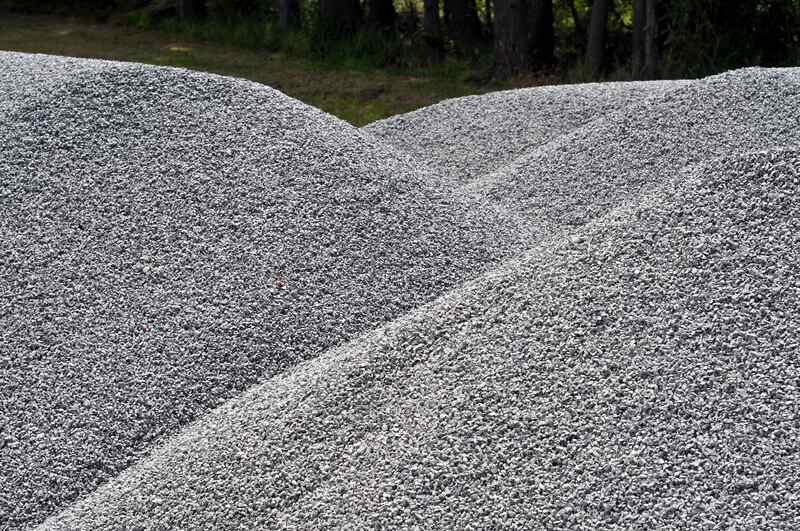Our aggregates are available in a range of styles, sizes and types. We carry decorative and construction aggregates that can be used for many different purposes in gardening, landscaping or building. With all the possibilities and varieties, it can become almost overwhelming to choose the right option for your garden.
This is why we’ve put together this list of the three main types of aggregates to use in your landscaping. They include washed sand, recycled asphalt and concrete, and road gravel products. These products were picked not for their aesthetic beauty, but their many functional possibilities. For decorative aggregate suggestions, check out this article. To learn more about functional aggregates, continue reading down below!
The Three Main Aggregates Used in Landscaping
Landscaping aggregates are versatile materials used for a variety of applications in outdoor spaces. These aggregates serve both functional and aesthetic purposes, helping to create durable surfaces, improve soil conditions, and enhance the overall look of garden and landscape projects. Here, we delve into the specifics of the three main types of aggregates used in landscaping: washed sand, recycled asphalt & concrete, and road gravel.
Washed Sand
Washed sand, characterized by its cleanliness and uniform particle size, is a highly versatile aggregate in landscaping. Available in sieve sizes of 3 mm and 5 mm, it is primarily used where a smooth texture and better compaction are required. The most common uses include:
- Its fine texture makes it ideal for use as a fill material in masonry projects, aiding in the laying of bricks and blocks by providing a compact, level base that enhances structural integrity.
- Washed sand is also used in stucco mixtures, where its purity helps in achieving a smooth finish on exterior walls.
- As a joint material, washed sand fills the gaps between paving stones, securing them in place and preventing weed growth and shifting.
- Employed as a fine pack, washed sand is excellent for solidifying and stabilizing the ground under construction and landscaping areas.
- Due to its soft texture and safety, it is often used in children’s play areas, providing a safe, cushioned surface that reduces the risk of injuries.
- Adding washed sand to garden beds can improve soil drainage and aeration, and is particularly beneficial in clay-heavy soils prone to waterlogging.
Landscaping aggregate such as washed sand is affordable in Calgary.

Aesthetic Applications
Washed sand is often used to create smooth and visually appealing surfaces within a landscape. Its fine texture is perfect for creating uniform, clean-looking areas around pavers, stepping stones, and patios. The light color of washed sand can brighten up garden paths and contrast beautifully with darker stones or bricks, enhancing the overall aesthetic of garden designs.
Gardeners and landscape designers use washed sand to fill sandboxes and as a base layer for small decorative ponds or water features. Its cleanliness ensures that it doesn’t cloud water and maintains a neat appearance. Additionally, washed sand can be used in zen gardens, where it is raked into patterns to promote a serene and meditative environment.
Horticultural Benefits
Washed sand is invaluable in conditioning soil in garden beds. It improves drainage and aeration, particularly in clay-heavy soils that are prone to waterlogging. By adding washed sand, gardeners can ensure that roots receive adequate oxygen, enhancing plant health and vigor.
For certain plant species that prefer well-drained soil, such as succulents and some native plants, incorporating washed sand into the soil can promote healthier root development. This prevents water from accumulating at the roots, thereby reducing the risk of root rot.
Recycled Asphalt & Concrete
Recycled asphalt and concrete are sustainable choices for landscaping, made by repurposing demolished construction materials. These aggregates are not only eco-friendly but also economical and durable.
The rugged texture and stability of recycled asphalt and concrete provide a solid, durable surface for foot traffic, ideal for creating garden paths or walkways around a property.
These materials are favored in rural or unpaved areas where they are used to cover roads or large driveways to prevent the formation of dust clouds during dry conditions.
Being one of the most cost-effective landscaping aggregate options, they offer significant savings for large projects without compromising on quality or durability.
Environmental Benefits
Using recycled asphalt and concrete contributes to environmental sustainability by reducing landfill waste and the need for virgin materials. This recycling process lessens the ecological footprint of construction and landscaping projects, aligning with green building practices.
Producing new concrete and asphalt requires significant energy and resources, contributing to CO2 emissions. Choosing to use recycled materials as landscaping aggregates can significantly reduce these emissions, supporting efforts to combat climate change.
Aesthetic and Functional Applications
Recycled asphalt and concrete are excellent for constructing durable, cost-effective pathways and driveways. They provide a stable, compact surface that withstands various weather conditions and heavy use. The textured finish of these materials also adds a rustic, industrial charm to landscape designs.
Using recycled concrete slabs or pavers can create unique, eco-friendly patios and terraces. These materials often feature an aged look that adds character and visual interest to outdoor living spaces. The inherent strength and weather resistance of concrete ensures longevity and durability.

Recycled concrete blocks and chunks are ideal for building robust retaining walls and garden edging. Their varied shapes and sizes lend a distinct, one-of-a-kind aesthetic to landscape projects, while their structural integrity helps control erosion and manage garden layouts.
Practical Uses
Both recycled asphalt and concrete serve as excellent sub-base materials for construction and landscaping projects. They provide a solid foundation for roads, driveways, and other structures that require a strong base to prevent settling and water damage.
Large pieces of recycled concrete are effective in erosion control applications, such as riprap in waterways or as protective barriers along shorelines and banks. Such landscaping aggregates, due to their weight and irregular shapes, bind together to form a barrier against water erosion.
Recreational Areas
Recycled materials can be used to construct walkways throughout gardens and parks. These paths can be designed to blend seamlessly with the natural environment, enhancing accessibility without detracting from the landscape’s beauty.
Recycled asphalt provides a flat, stable surface ideal for outdoor sports courts, such as basketball or tennis courts. Its smooth texture allows for proper ball movement and player safety.
Economic Benefits
Recycled asphalt and concrete are typically more affordable than their new counterparts. The cost savings extend not only to the materials themselves but also to transportation and disposal fees.
Once installed, recycled asphalt and concrete require minimal maintenance. Asphalt, for instance, can be resealed to extend its lifespan and enhance its appearance, while concrete pieces are naturally wear-resistant.
Road Gravel
If you need landscaping aggregates, you are probably looking for road gravel. Our 20-mm seize size ensures you get a great mix of sand and gravel that will compact down and form a sturdy, lasting surface. Some people may know this product as road crush or crushed gravel, but all who have used it know the aggregate as a useful and versatile landscaping product.
Road gravel, often referred to as road crush or crushed gravel, consists of a blend of sand and gravel that compacts well, making it a staple material for various landscaping and construction projects. Its uses include:
- Driveways and access roads. The excellent compaction properties of road gravel make it suitable for creating stable and durable surfaces for driveways and access roads that can support vehicle traffic.
- Base material. It serves as an ideal base material for laying the foundations for patios, sheds, and other structures, ensuring a stable and level ground.
- Landscaping designs. Beyond its practical applications, road gravel is also used decoratively in landscaping to create rustic paths, enhance garden beds, or as a ground cover that suppresses weeds and retains moisture.

Each of these landscaping aggregates brings unique properties and benefits to landscaping projects, allowing for creative and practical applications that enhance the functionality and aesthetic appeal of outdoor spaces. Whether you are constructing a new pathway, improving soil texture, or building a durable driveway, choosing the right aggregate is key to achieving the desired outcome.
Find Your Favourite Aggregate Product Today
While Soil Kings provides a large selection of quality aggregates, the three products mentioned above offer a unique combination of functionality and appearance that makes them the three main products used for landscaping. Still, your garden and property are your own, so don’t feel constrained by the popular options. We appreciate and encourage creative builds and imaginative landscapes.
And, with a devotion to low delivery fees, quality products and exceptional bulk orders, we have everything you need to make your dreams a reality. Contact our friendly staff today to get started, or place your order online at your convenience. We look forward to hearing from you and helping you meet your bulk aggregate needs!




